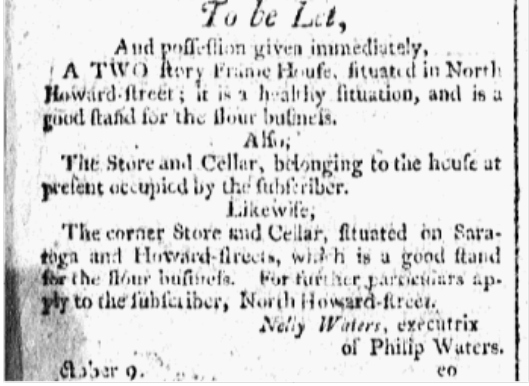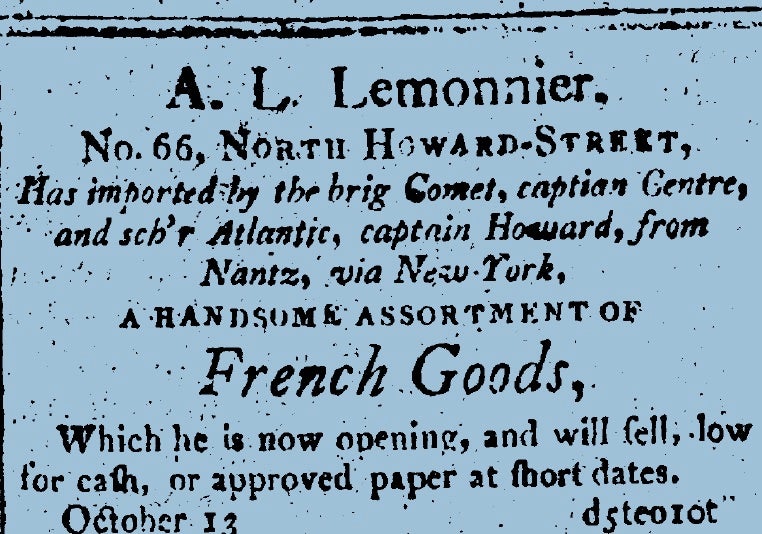Other Family Members

Philip Waters, tax record on his estate. Page from Baltimore City Tax Records, 1803. Baltimore City Archives.
JLN’s grandfather, Philip Waters (d. 1798), and a number of men in her grandmother’s family were flour merchants, grocers, sea captains, and importers. Philip Waters came to the area after the Revolutionary War, sometime between 1784 and 1787, possibly from Holland, though it is not known if that was an intermediary stop for him. He enslaved at least two people of African descent and contracted with a few indentured servants of English descent. His daughter by his first marriage, Ann Waters, married Etienne (sometimes called Stephen) Zacharie, and they, quite wealthy, moved to New Orleans in the early 1800s. They owned a number of enslaved persons as did Ann Waters Zacherie’s half-brother, James Waters. Young Jo and her siblings, Victor and Ellen, as well as father Alexander Le Monnier remained close to the Zacharies. Alexander LeMonnier worked for James Waters Zacharie, a son of Ann and Etienne. One of the Zacharies married a Henderson, thus giving a double connection to that family which would come later with Jo’s sister Ellen’s marriage to William Henderson.

Nelly Waters, grandmother of JLN, advertisement for a house to be rented. Baltimore Daily Intelligencer, Oct. 23, 1798.
Young Jo was very close to her grandmother, Nelly Hincks Waters (d.1836), who survived her husband by almost forty years and her daughter, JLN’s mother, by five years. Nelly Waters advertised a rental house left to her by her husband. Besides her literacy and skills as a businesswoman, Eleanor Hincks Waters was interested in reform, joining one of her church’s first groups to concern itself over the plight of orphaned girls. The Hincks family, like some among the Zacharies, Waters, and LeMonnier families, also migrated to New Orleans, such that by the 1830s, three of Nelly Hinck’s nephews were living there.

Advertisement by JLN’s father, Alexandre Lemonnier, or more often written as Alexander Le Monnier, who sold “French goods” in Baltimore in the early 1800s.
Philip Waters and Nelly Hincks Waters had a daughter, Mary Sophia Waters (1789-1831) who was born in Baltimore, a first-generation American, and died there, as well. Mary Sophia Waters married Alexander Le Monnier in 1809, and these two were the parents of Jo, as well as two other children.
Mary Sophia Le Monnier’s family, the Hincks and Waters, had a stronger and earlier presence selling similar French goods than did her husband. The firm Rogers and Hincks, for example, sold “ribbons of every description; laces, black and white shawls … ladies shoes” as well as various kinds of wine. In 1812, Alexander Le Monnier posted entries in a used Rogers and Hincks accounting book, (now at the Maryland Historical Society) suggesting that, though his business was smaller, the two firms cooperated. However, Le Monnier’s goods were sold at a sheriff’s sale in 1823. Young Jo would have been then seven years old.


